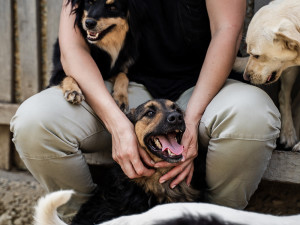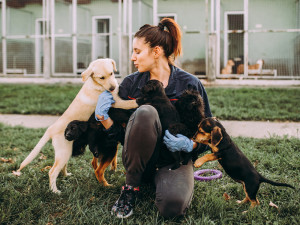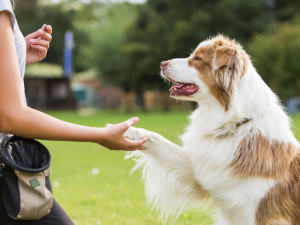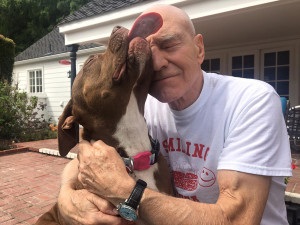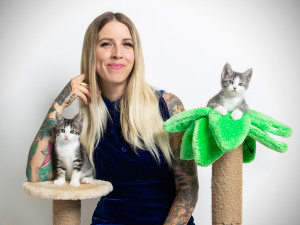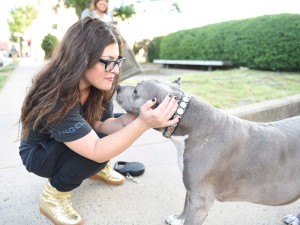Maui Humane Society’s Innovative Programs Unite Dogs and Island Visitors
This shelter program gives its dogs a day of fun, hanging with a vacationer who’s primed to go out and explore.
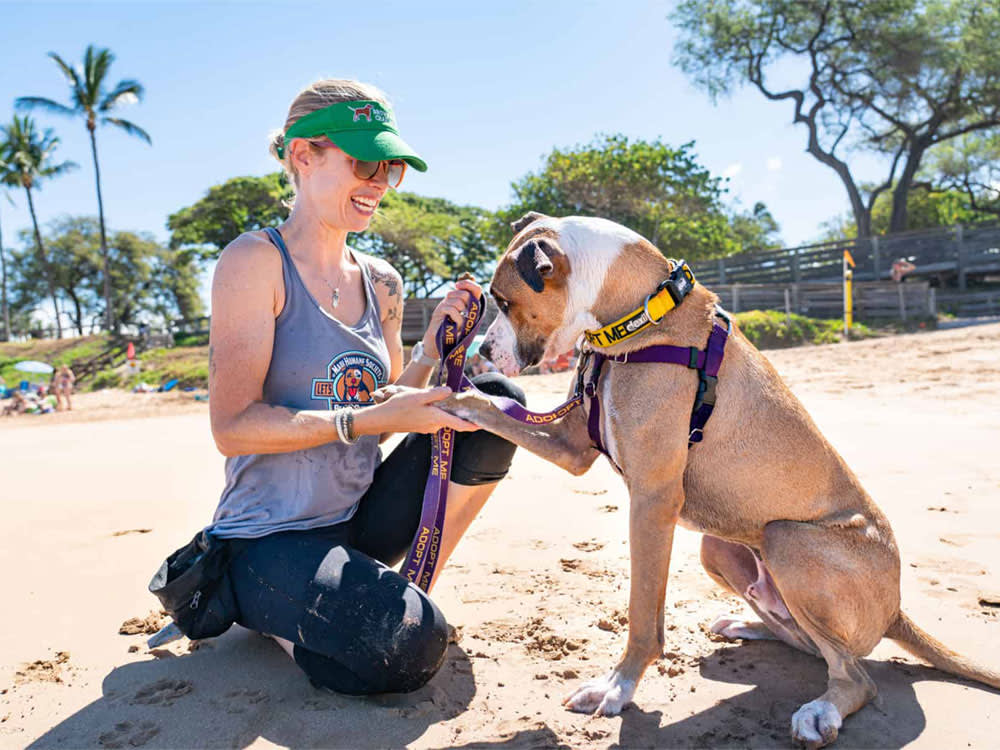
Share Article
Are you planning a Hawaiian vacation to Maui? First of all, lucky you. But second, did you know you can help shelter dogs during your time on the island? Maui Humane Society’s Beach Buddiesopens in new tab program gives its dogs a day of fun away from the shelter, hanging with a vacationer who had already planned to go out and explore.
Shelter dogs everywhere benefit from a break in routine. Even in the best facilities — and, yes, even in Hawaii — shelter life is stressful for most dogs. Getting outdoors, exercising, and interacting with the world does wonders for these dogs’ emotional health, ultimately making them more adoptable.
How Maui Humane’s Beach Buddy Program Started
Beach Buddies started in April 2015 and required a leap of faith, according to Jerleen Bryant, the society’s former CEO. “The shelter on Kauai had started a program called Shelter Dogs on Field Trips, and it had been going about a year; they had great success and limited problems. We held off another year, asking lots of questions, [then launched] our own program.”
For Bryant, the overriding factor in determining whether to go with the Beach Buddies program was how the program would benefit the animals. She knew that socializing and exposure would improve adoptions, so decided to give it a try.

How Beach Buddies Works
So far, Maui Humane Society (MHS) staff and volunteers— not to mention the dogs—love the program, which has grown with five or more “Beach Buddies–approved” dogs available each day.
“People are calling all the time to participate,” Bryant says. “The program is now always fully booked, but if people book a time far enough ahead, they’ll get in.” With more resources, Bryant hopes they can add more days per week to meet demand, which would be a plus for dogs and vacationers alike.
Selecting Your Beach Buddy
The program is run by a volunteer coordinator who matches dogs — both small and big — with vacationers who have signed up online. “We choose rock-solid, no-red-flags dogs,” says Bryant. “Once the dogs are selected, people who sign up can choose among them, first-come-first-served.
The shelter has five staging areas, where, among other things, the lucky dogs chosen to participate are bathed before meeting their vacationer and heading out the door.
Going on an Island Adventure
All Beach Buddies go out with special “Adopt me!” harnesses and leashes, a backpack with supplies for the day (including a towel, water, bowl, poop bags, treats, and emergency contact info) and a list of suggested places to visit. Participants are encouraged to record their outings, and the shelter shares their videos and photos on its Facebook pageopens in new tab.
Beach Buddies’ Impact
After the outing, MHS asks participants to provide a write-up of their experience for potential adopters — it’s another way to help the shelter and its dogs. What’s more, Bryant’s hope for the program ultimately came to be realized: adoption rates are better because of the Beach Buddies dogs. “Some people adopt the dog they took out for the day,” she says.
Maui Humane Society Brings Pups to the Mainland
For those of us who aren’t going to travel to Maui any time soon, MHS has another program that involves the mainland. Wings of Alohaopens in new tab is a program through which the shelter flies some of their dogs to the mainland, where partner shelters help find them homes.
Wings of Aloha was born out of desperation, according to Bryant. On Maui, there are far more dogs than homes able to take them in. The island has a population of roughly 140,000, and the shelter takes in 8,000 animals each year, one-third of which are dogs. The shelter is working hard to control the island’s population of homeless animals, but given the obstacles they face (a finite number of homes able to adopt, the difficulties renters face when trying to adopt), the shelter staff asked themselves what MHS could do to address the imbalance. The answer? Wings of Aloha was born in 2012, and MHS has shipped hundreds of dogs to partner shelters on the mainland since.
When Wings launched, Bryant was the shelter’s director of development. Before moving to Maui, she had run a rescue organization in Oregon, often pulling up to 40 dogs at a time from shelters if their lives were at risk. Moving large numbers of dogs didn’t faze her. However, the cost of doing so was an obstacle. Fueled by donor money, Wings of Aloha began by purchasing airline tickets and crates to transport the dogs stateside, also paying to return the crates, which turned out to be cheaper than buying new ones.
How COVID-19 impacted the program
Since the COVID-19 pandemic, however, the program has changed: due to airline restrictions, including some airlines not allowing pets to fly or restricting the number of animals allowed on a single flight, there is a more thorough process involved with transporting MHS dogs.
In 2022, MHS still sent over 600 animals through the program, however, and can still help people who are interested in adopting a pet transport that pet home. Go to mauihumanesociety.orgopens in new tab to learn more information.

Rebecca Wallick, J.D.
Rebecca Wallick, was long-time contributing editor for The Bark magazine and retired family law attorney, she lives with two dogs and runs mountain trails at every opportunity.
Related articles
![A woman holding up a treat while shaking a dogs paw.]()
So, You Want to Work with Animals
On the prowl for a new career path? A director at the Humane Society has some pro tips.
![A loving pitbull licking a man's face.]()
Picard’s Dog Was Inspired by Patrick Stewart’s Pit Bull Advocacy
The legendary actor fell in love and is now a Pit Bull champion.
![The Wildest's cover star Hannah Shaw smiling at the camera behind a cat tower with two kittens sitting on top of it]()
“Kitten Lady” Hannah Shaw Is Fostering a Movement
The lion-hearted animal advocate on rescuing her first kitten in a tree, designing an orphaned animal nursery, and becoming an Instagram sensation.
![Rebecca Corry with her dog]()
Comedian Rebecca Corry Stands Up for Pit Bulls
“Comedy and entertainment — that’s my passion. But my purpose in life is saving dogs. And somehow I have managed to combine the two.”
